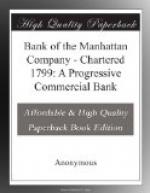Resolved that Samuel
Osgood, John B. Coles and John
Stevens be a committee
to report with all convenient speed
the best means to be
pursued to obtain such supply.
[Illustration: Old Wooden water mains]
On May 6th, 1799, the water committee was empowered “to contract for as many pine logs as they may think necessary for pipes and also for boring the same.”
[Illustration: Contemporary Cartoon]
A number of wells were sunk, reservoirs and tanks built, and the distributing system extended generally through the city south of City Hall.
About 1836 the system was extended north along Broadway as far as Bleecker Street, and at that time the company had about twenty-five miles of mains and supplied 2,000 houses.
[Illustration: Manhattan company Reservoir on Chambers Street]
While the water was said to be “wholesome,” its quality did not give entire satisfaction, as may be seen from the muddiness of the water in the glass held by “Pure Manhattan” in the contemporary cartoon reproduced on the opposite page.
Over one of the earliest wells, at the corner of Reade and Center Streets, a tank of iron plates was erected. This tank is now inclosed in an old-fashioned building which is still owned by the Manhattan Company.
The Company continued to operate its water service until about the time the Croton system was completed in 1842.
[Illustration: Old water Gate dug up in Park Row in 1900]
FOUNDING AND EARLY HISTORY OF THE BANK
On April 17, 1799, a committee of the Directors was appointed
“to consider the
most proper means of employing the capital
of the Company.”
The committee reported on June 3, 1799, in favor of opening an office of discount and deposit, and a house was bought on the site of the present No. 40 Wall Street, in which, on September 1, 1799, the “Bank” of the Manhattan Company began business.
The following is one of the earliest advertisements, reproduced from the Mercantile Advertiser, October 9, 1799:
Manhattan company.
The Office of Discount and Deposit will open for the transaction of business, for the present, at 10 o’clock in the forenoon, and continue open until 3 o’clock in the afternoon, when the business of the day will be closed.
Henry Remsen, Cashier.
September 24.
[Illustration: Wall Street in 1803 Present No. 40 Wall Street]
The first action of the Directors after the opening of the Bank was:
Resolved, That
this Board will hereafter meet twice
a week, to wit, on Mondays
and Thursdays of each week, at 11
o’clock.




